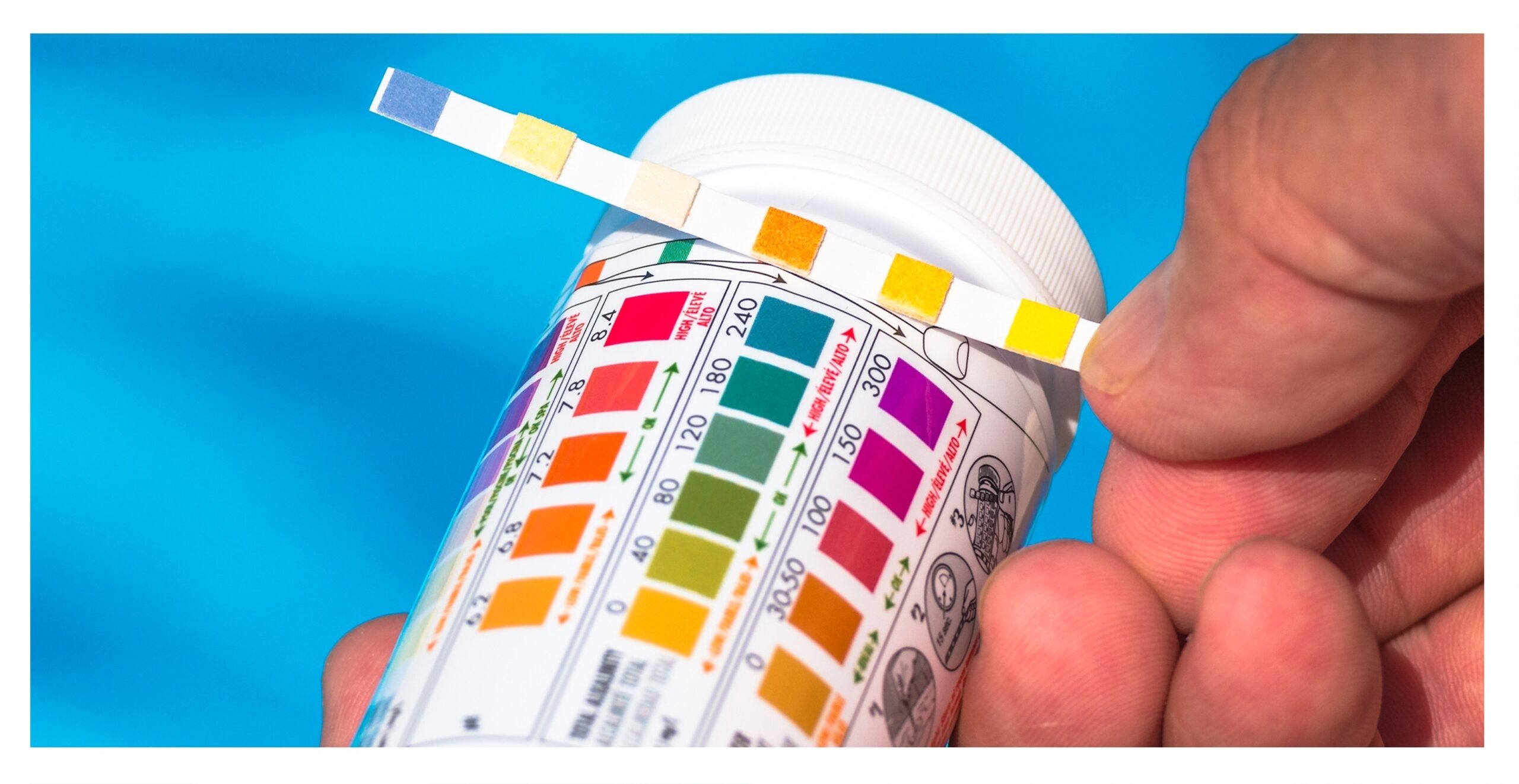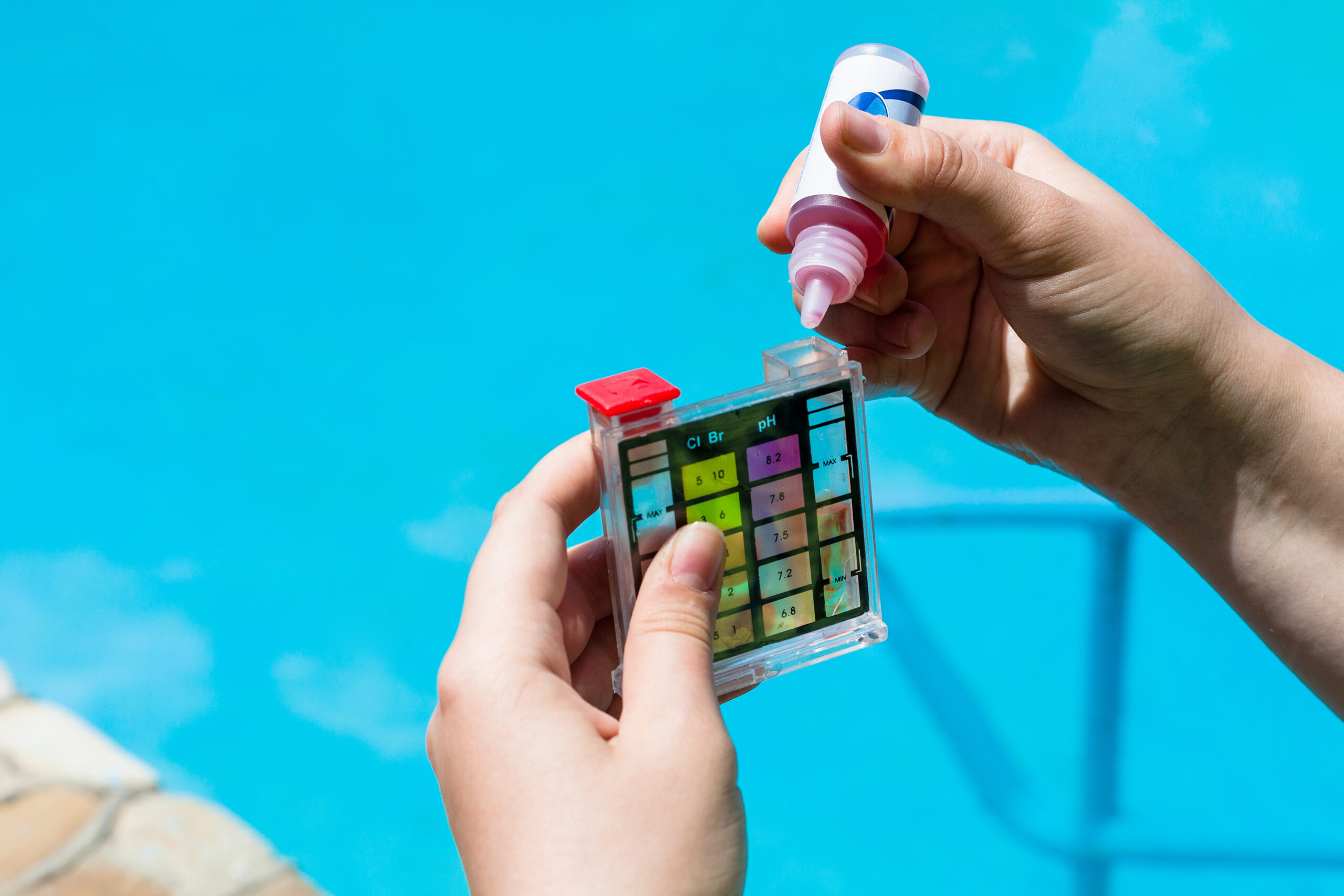With the 4th of July just around the corner, it is important to make sure that your pool water is properly balanced in order to prevent unsightly cloudiness and algae blooms from ruining your party. Let’s go over the importance of weekly testing and different techniques.
There are 5 Keys to Pool Care. They are:
Circulation, Cleaning, Filtration, Testing, Chemistry
Testing your pool water weekly is imperative to keeping your pool clean, clear, sanitized, and safe for swimming, and to protect the equipment. When the water chemistry is out of balance for too long, it can cause corrosion or scaling; both equally destructive. The most common ways of testing your pool water at home are with test strips and liquid reagent kits. We will go over both, and the parameters that you need to keep your water balance in to avoid problems.
Test Strips

Test strips are the easiest way to get a quick look at the balance of your water. Test strips generally only test for pH, Alkalinity, Sanitizer, and CYA (Stabilizer). For each, it is usually shown on the back of the bottle what the “ok” range is. The Caveats with test strips are that the results can be easily interfered with when used improperly, and can be sometimes hard to read and compare to the chart. In order to prevent faulty results on your test strip, follow these steps:
- Take a sample of water from the pool, away from the skimmers and returns, and about 18″ down. Make sure to not use a container that had liquid in it prior to taking the sample, and that has no metal in the container (no mason jars) to avoid contaminating the water sample. A Tupperware container is sufficient.
- Open the lid and gently shake the bottle so the test strips are at the opening of the bottle and easy to grab.
- Take one test strip, careful to not touch the rest. close the bottle immediately.
- Dip the strip into your sample, do not shake the water off the strip, wait 15 seconds and compare it to the chart on the bottle.
Drop Reagent Kits

Drop kits are another easy way of testing your pool water at home, although there are more steps. There are many different variations of test kits that test for different variables, but generally, they test for sanitizer levels (Free Chlorine, Total Chlorine, Bromine) Alkalinity, and pH. In my opinion, drop kits are easier to see and compare colors, making them slightly more accurate. Because they are dependent on drops and filling the tubes to the same level every time (they have an easy to see fill line) there can be more opportunities for human error. If you are a person that follows directions closely and wants more control over testing, this may be the way to go.
Ideal Levels For Chlorine Pool Water
pH: 7.4 – 7.6. The perfect pH for pool water, swimmers, and equipment is 7.5.
Alkalinity: 125 – 150
Calcium Hardness: 175 – 225
CYA (Stabilizer): 30 – 150
Free/Total Chlorine: 1 – 3
Ideal Levels For Bromine Pool Water
pH: 7.4 – 7.6
Alkalinity: 125 – 150
Calcium Hardness: 175 – 225
CYA (Stabilizer): 0-30
Bromine: 2-4
Ideal Levels For Biguanide Pool Water
pH: 7.4 – 7.8
Alkalinity: 125 – 150
Calcium Hardness: 200 – 275
Sanitizer Level: 30-50
Clarifier/Shock Level: 40-60
If they are not balanced, what can happen?
pH is measured on a logarithmic scale. This means that if the pH in your pool is one point lower than it should be, it is 10x more acidic. if it is two points lower, it is 100x more acidic, and so on. if the pH is left low for a long time, it will start to corrode pump seals, heat exchangers, ladder escutcheons, stainless steel faceplates, etc. If it is left too high, it will cause cloudiness and scaling, which can damage pool surfaces, burn out your heater, damage salt systems, etc. Water is the universal solvent. If we do not give it the minerals that it needs by balancing the water with chemicals, it will take from the pool and equipment.
There are times when testing with these methods at home may not be enough. If you find that you are having trouble holding a chlorine residual, or are battling algae growth or cloudy water, you will need to bring a sample of water to a BioGuard dealer. BioGuard dealers have industry-leading testing equipment that can test for more than at-home test kits can. The testing is done digitally which eliminates nearly all chances of human error. BioGuard dealers offer free water testing. When in doubt, bring a sample in.



